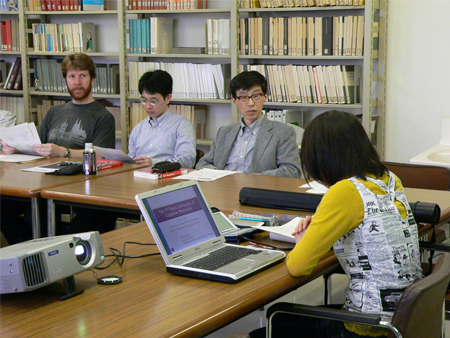Report: The 7th Tokyo Colloquium of Cognitive Philosophy (TCCP)
The program of the 7th TCCP was text reading, and we read the preface and chapter 1 of J. J. Prinz’s book Gut Reactions: A Perceptual Theory of Emotion (2004).

The preface explains the situation of emotion research in cognitive science and mentions Prinz’s goal in this book. Although emotions have recently become a major topic in cognitive science, researchers have hardly reached an agreement about what emotions are. In this book, Prinz tries to synthesize a number of theories. To do so, he provides a theory. The theory has its origin in an account that was first proposed by William James and Karl Lange and has been recently revived by Antonio Damasio. Their account has a problem in explaining the meaningfulness of emotions. Thus Prinz tries to give his own answer in this book.
In Ch. 1, various theories of emotions are introduced. In doing so, Prinz examines their approaches to the problems which Prinz thinks they need to solve, namely, the Problem of Parts and the Problem of Plenty.
Typically, emotion episodes contain a number of components, such as “thoughts, bodily changes, action tendencies, modulations of mental processes, and conscious feelings” (p. 3). But which of them is the emotion? Can any part be subtracted, or are there some parts essential for the emotion? This is the Problem of Parts.
Theories of emotion can be divided according to ways they solve this problem. There are some theories which equate emotion with one particular component. This component constitutes an emotion episode with all the other inessential components. Other theories, in contrast, claim that emotion contains several essential components. Prinz calls the latter hybrid theories.
Hybrid theories capture one significant aspect of emotion; that is, the complexity. Emotions are complex, containing a number of different components. Privileging one arbitrary component as the emotion may undermine that complexity. For this reason, researchers tend to propose hybrid theories in which emotions involve as essential parts all the components mentioned above. Prinz calls hybrid theories of this kind encompassing theories.
Although encompassing theories have an advantage in explaining the complexity of emotions, they also take a risk. If all of the different parts are equally essential, how do they hang together as a single, coherent whole? Here arises the Problem of Plenty. The Problem of Parts asks what the essential component of the emotion is. If one gives a hybrid answer, then the Problem of Plenty asks how different parts are combined as one emotion. In other words, the Problem of Plenty is the problem which “asks for an essential function of emotions in virtue of which they may have several essential components” (p. 18).
Prinz classifies hybrid theories into three categories: multifunction hybrids, multicomponent hybrids, and precondition hybrids. According to him, the best answer to the Problem of Plenty is the one offered by multifunction hybrids. A multifunction theory claims that the many parts that make up an emotion are, in fact, not separable at all; they are really different functions of one coherent state. This is an effective resolution to the Problems of Plenty, which asks how different parts hang together.

Prinz holds a multifunctional theory. His theory, inspired by the works of James-Lange and of Damasio, equates emotions to perceptions of the body and our relations to the world. Based on this equation, Prinz assigns “complex effects and information-processing roles” (p. 20) to emotions without making it a mixture of unorganized components.
The main opponent of his theory in this book will be the hybrid theories which afford a central role to cognition. Dimensional appraisal theories, which have a high popularity among contemporary researchers, are examples of such theories. The reason these theories appeal to researchers is that they capture our “deep intuition that emotions are meaningful” (p. 16). Such an intuition can be explained well by including cognitive components in emotions. Prinz takes a non-cognitive theory, however. He claims that cognitive theories are “fundamentally mistaken” (p. 20). Hence he needs to explain the meaningfulness of emotion in non-cognitive terms, and this will be the theme of the next chapter.
Haruka TSUTSUI
UTCP Collaborative Research Fellow
[Presentation] Download (PDF, 453KB)
![]()
Download (MP3, 26.2MB)
Play 【Windows Media Player】 【Real Player】 【QuickTime】






